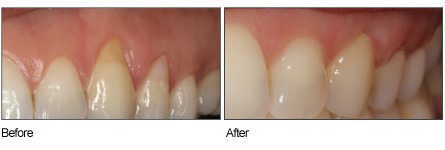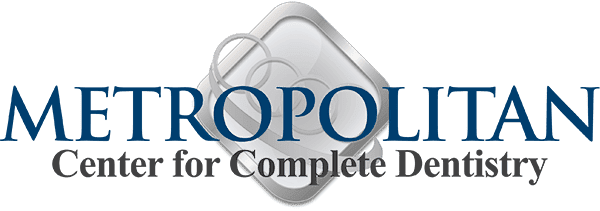Receding gums are a major dental concern for several reasons. The most obvious concern for patients is the appearance of the smile. As the gums recede, more of the tooth is exposed, which can often cause an unattractive or uneven smile. Many patients want to correct receding gums so they do not have an uneven smile.
More than the cosmetic concerns, however, receding gums can lead to a host of other dental concerns. As the gum line recedes, the tooth’s root becomes exposed. This area of the tooth is not protected by hard enamel like the tooth’s crown, so it is more susceptible to tooth decay. Receding gums form pockets that house bacteria that cause gum disease and infection. Receding gums also lead to deterioration of the bone, which can eventually lead to tooth loss.


What Causes Receding Gums?
Several factors can contribute to receding gums. It is important to be aware of the causes of receding gums to avoid some of the causes. Continue reading to learn more about the most common causes of receding gums. Most commonly, they are caused by or contributed to by:
- Smoking and/or tobacco use
- Gum disease
- Over-brushing (brushing too vigorously)
- Genetic Predisposition
- Hormonal changes (such as pregnancy)
- Certain types of medication
- Poor oral hygiene
- Age
- How to Fix Receding Gums
A professional must treat receding gums. An experienced dentist, like Dr. Upadya, can evaluate your condition and recommend the best treatment. If you have just started to notice receding gums and your condition is not advanced, we may offer you a nonsurgical treatment method with special instructions for at-home care. The way receding gums are treated varies.
Non-Surgical Treatment Approaches
When receding gums are caught early, various non-surgical treatment options are available. Increasing your oral care routine by using proper brushing and flossing techniques is the number one non-surgical treatment option. Patients may also schedule regular dental cleanings in our office to prevent gum recession by removing any built-up plaque. Using antibacterial mouthwashes may also help to regulate bacteria growth.
Pinhole Gum Rejuvenation – Lunchtime Gumlift™
Dr. Upadya may offer several treatments for patients with more advanced gum recession, including the new micro-invasive Pinhole Gum Rejuvenation technique known as the Lunchtime Gumlift™.
Dr. Upadya is one of 150 dentists worldwide to be trained and certified by Dr. John Chao, the inventor of the Pinhole Surgical Technique. This treatment is an alternative to traditional gum grafting and does not require any cutting or stitches.
Dr. Upadya will use a small needle to make a hole in the gum tissues. The pinhole technique uses specially designed dental tools to gently loosen the gum tissue and move it over the receded part of the tooth. He will place collagen strips under the gums to secure the gum tissue as it heals. This can be accomplished using scalpels and will not require stitches.
Since there is no cutting involved, there is minimal post-operative pain. The pin-sized hole should heal fairly quickly. This procedure is safe, effective, and offers the most comfort for the patient.
Benefits of Pinhole Gum Rejuvenation
- No incisions, no sutures
- Performed in our East Hanover, NJ, dentist’s office
- Local anesthesia
- Quick, safe treatment
- More teeth can be treated in a single visit compared to traditional gum surgery
- With much faster healing time, most patients can eat a normal dinner on the evening of their procedure
Surgical Treatment Methods
Other treatment options are available to patients who do not want to undergo pinhole gum rejuvenation. Scaling and root planing is one option for treatment. This involves a deep cleaning to remove bacteria at the tooth’s root. Built-up bacteria cause gum recession; however, removing it can help to remove recession. Along with a deep cleaning, gum grafting can help promote gum growth. Gum grafting not only restores aesthetics to patients’ smiles, it also helps to replace missing gum tissue and promote gum rejuvenation.
Receding Gums FAQs
Do you have further questions about receding gums and how they can be prevented and treated? Continue reading to learn more and find answers to frequently asked questions in our office.
How long does it take for receding gums to heal after treatment?
On average, it takes about 2-4 weeks for gums to heal, but it can take longer depending on the severity. You will want to schedule a follow-up appointment with your dentist to check your healing and overall gum health.
Can gums grow back?
Once gum recession has occurred, your gums cannot grow back. Gum tissues are not regenerative and will not grow back. Dentists can attempt to retouch receded gums or provide successful gum rejuvenation procedures to restore gums.
How can I strengthen my gums?
The best way to strengthen your gums is to floss daily. Regularly scheduled dental cleanings are another way to keep your gums healthy and catch any issues early on while treatment options are minimally invasive.
What happens if receding gums are left untreated?
If receding gums are left untreated, they may lead to gum disease and total tooth loss. It also increases patients’ risk of a stroke or heart attack. Treatment is available for receding gums to prevent further complications. Call us today if you have any questions!
When should I worry about my receding gums?
Receding gums become a concern when they recede below tooth roots. Receding gums have increased patients’ risk for tooth decay, tooth infection, and tooth loss. If you are concerned your gums may be receding, call us today to schedule a consultation!
Can teeth fall out from receding gums?
Receding gums may cause patients’ teeth to fall out. This is typically due to teeth shifting, which may loosen specific teeth, causing them to fall out. The sooner you begin treatment for receding gums, the less likely you are to be at risk for tooth loss.
Schedule a Consultation for Receding Gums Treatment
To avoid long-term problems, it is best to deal with receding gums as soon as possible. Contact our office to schedule an appointment with East Hanover, NJ, and Summit, NJ, area dentist Dr. Raj Upadya to find out which treatments best fix your gum recession. Call 973-241-5169 or request an appointment online.
